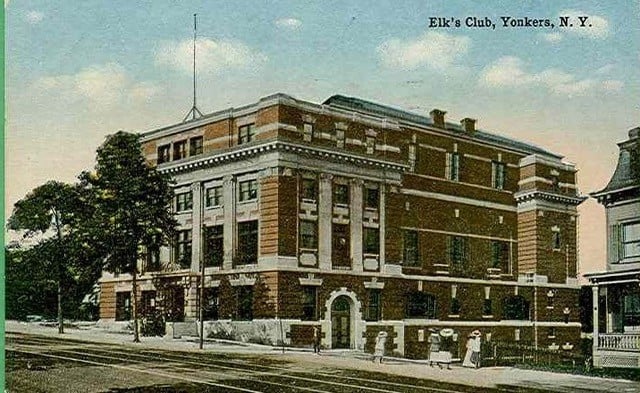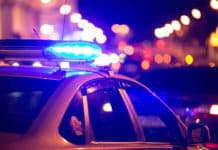
The Elks Club at the corner of Park Hill Avenue and South Broadway
By Mary Hoar, City of Yonkers Historian, President Emerita Yonkers Historical Society, recipient of the 2004 Key to History, Member of the Yonkers Landmarks Preservation Board, and President Untermyer Performing Arts Council
Monday, March 25th
March 25, 1906: After testing our drinking water, the Yonkers Water Bureau announced our water supply was “about one or two percent less than absolute perfection.”
Residents complained about Yonkers water, claiming our drinking water was “impure and a disease breeder;” many others filed complaints about the pollution of the Nepperhan River.
March 25, 1931: Detective William Daly captured two men in Getty Square early morning; both were wanted in Newark for murder and arson! Daly later received kudos and commendations from the New Jersey department.
March 25, 1943: Alexander Smith and Sons Carpet Company received another government contract to manufacture 250,000 more yards of cotton duck; This raised their contracted war duck production to 1.75 million yards!
Tuesday March 26th
March 26, 1917: Former Police Chief Daniel Wolff announced Veterans of the Spanish-American War would serve as the nucleus of the Yonkers Regiment being formed under leadership of Captain Joseph Stillwell, USA, to serve in case of War.
March 26, 1953: Eleanor Cauchois was elected President of the Community Chest, the first woman Community Chest president in Yonkers… and in New York State!
March 26, 1953: The Inter-Faith Committee of Yonkers (clergymen and laymen) held its first “Day of Religious Observance” for thousands of Yonkers students of all faiths. Students in grades nine through twelve were excused after first period class; they all headed to churches and synagogues throughout Yonkers for a day of reflection.
Wednesday, March 27th
March 27, 1911: The McLean Avenue trolley line was stopped cold by a cow! Bossy wandered from a nearby farm and decided she liked standing on the tracks. Despite tugging—and pleading– by the trolley crew and the passengers, she refused to move… until she wanted to move.
March 27, 1942: Although the Common Council purchased property at 463 Walnut Street several days earlier to prevent a woodworking mill being built on the lot, it did not know exactly how much land they purchased! City Hall began investigating deeds to determine exactly how much land they bought. At the time of purchase, the Council designated it for a park, even though it was just 300 feet from Doyle Park.
March 27, 1943: After hearing a rumor NYC Mayor Fiorello LaGuardia was to be assigned as a Brigadier General in Africa, Yonkers Mayor Benjamin Barnes telegraphed: “If you want another Mayor to back you up, you can count on me.”
Thursday, March 28th
March 28, 1942: Dr. William Crocker, announced Boyce Thompson Institute would create five demonstration Victory Gardens in Yonkers: Beechwood Terrace; Boyce Thompson Institute; McLean Avenue and Sanford Street; Oakland Avenue and Colonial Parkway North; and behind 290 Jessamine Avenue. Director Crocker said they would be gardens “anyone can grow” and contain “vegetables furnishing an abundance of vitamins.” The Institute planned weekly Saturday afternoon sessions at the gardens.
March 28, 1943: Staff Sergeant John Quinlan of Truman Avenue had a narrow escape during an American air assault over France. The Yonkers tail gunner in the American Flying Fortress “Hunk-o-Junk” fired 200 rounds and downed a Nazi Focke-Wulf, sending it into a flaming dive. Although a second plane put his guns out of commission, his plane landed safely. Quinlan later found an unexploded 20-mm canon shell in the rear compartment; it would have killed him if it detonated.
March 28, 1946: Stating men old enough to be drafted into the service are old enough to be allowed to take part in government, the Young Democratic Club voted to begin a campaign to reduce the New York State voting age to eighteen.
Friday, March 29th
March 29, 1917: Public Safety Commissioner James Fleming ordered Yonkers police officers to report to the Yonkers Armory for special drills and instructions in case of war.
March 29, 1934: Cottage Lawn, the Ludlow Family homestead, was torn down. Erected over three years, it was the first house in the Ludlow section. Six and seven room homes were built on the property.
Saturday, March 30th
March 30, 1942: Yonkers hit a snag in its legal battle to foreclose on the Elks Building on South Broadway; Justice Mortimer Patterson ruled the Board of Education should be a party to the lawsuit, something demanded by the Yonkers Lodge of Elks. Corporation Counsel Leonard McAneny labeled it a “temporary delay,” The building was supposed to be purchased by Yonkers Board of Education; when the city started foreclosure, the Board rented the building for $450 a month. The Elks claimed this would not only “carry the building,” but leave $1800 to begin to pay off their tax arrears.
March 30, 1951: Thousands of dollars were found in the old Bigelow mansion, 204 Hawthorne Avenue, including $34,000 found by two boys two days earlier; with no indication when it was hidden, federal tax agents contended it must be considered income earned the last year of Mrs. Bigelow’s life and taxed as income. They estimated approximately $300,000.00 of the $350,000 found would be collected for taxes. Heirs would have to pay inheritance tax on the remaining $50,000.
Sunday, March 31st
March 31, 1906: Sixty feet of a Croton Aqueduct retaining wall crashed down, smashing clapboards and windows at three Garden Street tenement houses. Although no one was injured, YFD had to help seventeen tenants escape. Assumption was heavy rain and warm weather were responsible for the landslide.
March 31, 1933: After calling the Yonkers Corporation Counsel’s office “one of the most expensive luxuries” at City Hall, J. W. Martin of Crestwood Citizens’ Tax and Budget Committee began investigating its cost. He later reported the department cost in 1932 was $72,974.
Questions or comments on this column? Email YonkersHistory1646@gmail.com.
For information on the Yonkers Historical Society, Sherwood House and upcoming events, please visit our website www.yonkershistoricalsociety.org, call 914-961-8940 or email
info@yonkershistoricalsociety.org





